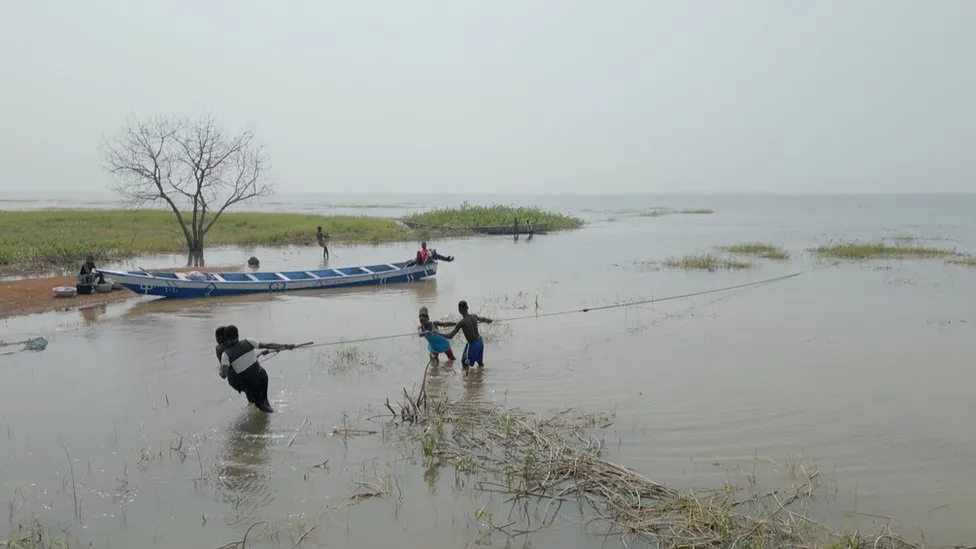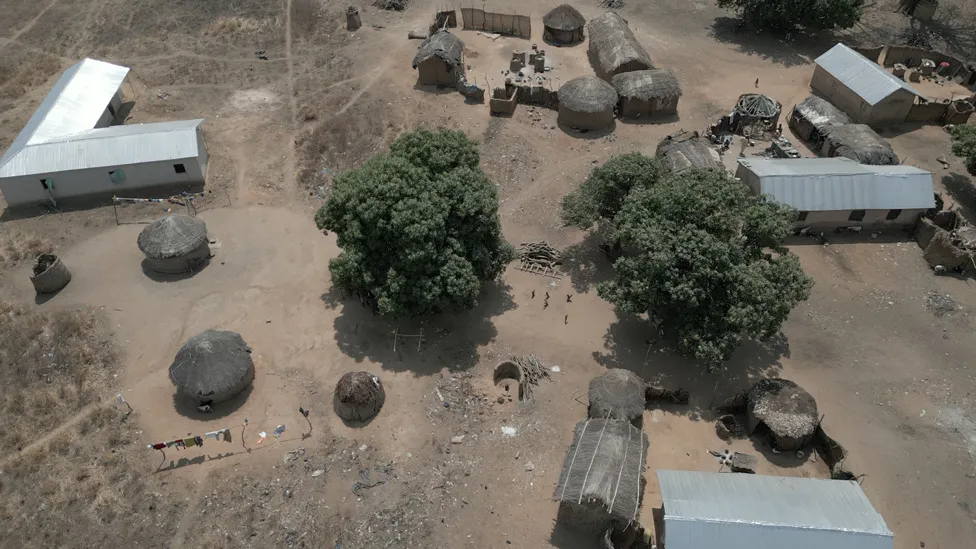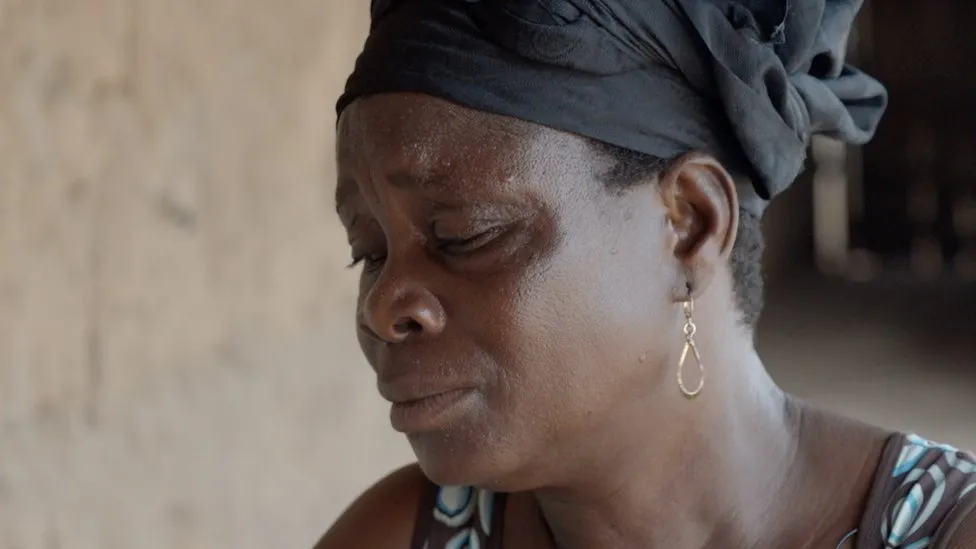Featured
Ghanaian children wrongly taken in raids backed by US charity IJM.
Published
2 years agoon
By
GhMediaHub
According to a BBC Africa Eye investigation, Ghanaian children have been abducted from their families in an operation supported by one of the foremost anti-slavery organizations in the world.
International Justice Mission is a multimillion-dollar charity that works to save and reunite trafficked children with their families. However, there are significant issues with their operations in West Africa.
On September 6, 2022, just after midnight, Musah Mustafa went outside to use the restroom and noticed four automobiles zooming toward his tiny community.
Mogyigna was merely a little town. It was more like a dot in the center of a vast countryside in northern Ghana, with just a few family dwellings and twenty individuals. Even during the day, it was uncommon to see a car. Musah watched from behind a tree. He shouted to awaken the other occupants as he watched armed men approach the two homes from the automobiles.
Before anybody could intervene, however, the men stormed into the huts. They forcibly abducted four kids, taking an 11-year-old girl named Fatima from the chamber where she had been sleeping with her grandparents by her arms and legs.
Sana, Fatima’s grandma, begged the men with a gun to her neck. She was baffled as to why the kids were being removed. Also abducted were two of the children’s uncles. Sana was worried that she wouldn’t ever see her family again.
The residents of Mogyigna believed that a brutal kidnapping had occurred.
However, this was not an abduction.
According to Ghana’s Human Trafficking Act, it was a rescue operation by Ghanaian police officials. The kids were given to social services to take care of.
IJM was the one who started the procedure.
IJM is one of the top anti-trafficking organizations in the world, receiving about $100 million (£78 million) in financing annually during the last two years.
Nearly 300 churches in the UK are said to support IJM, and IJM UK generated more than £220,000 ($280,000) from churches and other contributors to fund activities in Ghana last year.
However, our analysis revealed that IJM had taken some children away from their families in situations where there was little to no proof of trafficking, and this aggressive approach may have been encouraged by a target-driven culture inside IJM.
We discovered two incidents of documented rescue operations in which children were taken away against their will, in a painful manner, and without cause; the children’s families were then charged with child trafficking. Fatima’s case was one of them.
IJM concentrates its efforts in Ghana on rescuing kids who have been trafficked to serve as slave laborers on Lake Volta, one of the biggest artificial lakes in the world.

About 300,000 people rely on the lake as their primary source of income, and children who work in the region’s fishing sector are subjected to varied levels of exploitation: some support their families through fishing, while others are hired to work under boat masters for little to no compensation.
The extent of the child trafficking issue on Lake Volta is poorly understood due to the lack of reliable data. More than half of all youngsters working on the lake were victims of trafficking, according to an IJM report from 2016.
The organization started saving kids from canoes on the lake in 2015, but in 2018 it started conducting night raids on places where kids were allegedly being kept overnight on land.
The raid that night in the village of Mogyigna was one such mission. It was dubbed Operation Hilltop.
Africa Eye began investigating IJM after becoming aware of concerns over their work in Ghana and placed an undercover reporter on the staff at the charity.
As Operation Hilltop unfolded, we could monitor what staff were saying to each other on an IJM WhatsApp group. We also gained access to social services documents relating to the case, giving Africa Eye an unprecedented insight into the planning, execution, and aftermath of the IJM’s rescue mission.
That evidence shows that while IJM was telling their partners in both the police force and social services that the four children had been trafficked, the charity had reached a different conclusion internally.
In an internal communication written after the operation, an IJM legal officer stated that the organization had already determined there were “no elements of trafficking” in the cases of Fatima and the other two children kidnapped that evening from Mogyigna. The legal officer concluded that just one of the four cases—that of Fatima’s cousin Mohammed—involved aspects of trafficking; however, Mohammed’s family disputes this assessment.
The mission to remove all four children, aged five to eleven, still went forward because IJM concluded that they were at risk of being used as child labor, a problem that, while terrible, did not call for such a violent raid.
The internal messages stated that there was a need to save the children since they were not in school, “working outside of the hours the law states they should not work, and deprived of good health,” and that they were being utilized for child labor.
For more than four months, Fatima and the other three kids were kept apart from their family and lived at a shelter run by an IJM partner before Ghanaian social services determined that the kids had not been trafficked and that they could be reunited with their families.

While Mohammed’s father and the father of the other two children agreed the boy should live somewhere else, Fatima is now back in the village and caring for her grandma Sana.
The people in Mogyigna told Africa Eye that although they were relieved that the children had been returned, Operation Hilltop’s consequences were still felt five months after the rescue.
Fatima expressed her concern that the BBC team had arrived to remove her once more.
About the night of Operation Hilltop, the 11-year-old recalled, “I was terrified, and I started crying.” “I believed they were removing us to murder us. We were unsure of their intended destination.
She believed her “grandmother, grandfather, and uncles had died” while she was in the shelter.
“When I was taken away, I cried a lot while thinking about my family,” she continued.
Nantogma Abukari and Sayibu Alhassan, Fatima’s uncles, were detained during the operation.
They spent all of their cash to travel to court for bail hearings after being charged with child labor and trafficking. They spent over two months of work spanning over 1,500 Ghana cedis ($132; £104) for each return journey to court.
The anti-slavery program of IJM includes prosecutions as a crucial component since, according to the nonprofit, they act as a deterrent. Court records reveal that an IJM attorney filled in for the state prosecutor during one of the court hearings.
Although the case against the uncles was ultimately dismissed and their names cleared, it is still an issue for them. They claimed that certain family members have stopped communicating with them because they believe they “colluded” in some way “with the people who took the children away.”
In response to questions from the BBC on Fatima’s case, IJM insisted that its mission had effectively relocated the four kids with their fathers to a safer area.

Africa Eye discovered a second questionable rescue when looking into Operation Hilltop. A kid and his brother were separated from their family in 2019 due to an operation, and the mother of the children, Mawusi Amlade, received a five-year prison sentence for child trafficking.
The most challenging part of being in prison, according to Ms. Amlade, was being separated from her children and not knowing what had happened to them.
She told Africa Eye, “I had no idea where my children had been taken; I kept thinking about them more than anything else.”
Two years later, in a strange turn of events, Ms. Amlade’s conviction was overturned thanks to involvement from the Sudreau Global Justice Institute, a partner organization of IJM and another US NGO.
In addition to releasing Ms. Amlade via an appeals process, Sudreau used her story as evidence of a miscarriage of justice in a fundraising effort.
Ms. Amlade was referred to as a “mother of two falsely convicted of a serious crime” in an Instagram post from Sudreau’s official account that was later deleted.
Ms. Amlade has still not been reunited with her kids after four years.
Despite the partnership, Sudreau informed the BBC that it operated separately from IJM and had no conflict of interest.
IJM stated it “does not decide whether a potential child trafficking case is pursued or whether any individual is arrested or prosecuted for offenses.”
The undercover reporter for Africa Eye took part in several conversations that could shed light on what went wrong with a nonprofit that aimed to aid the underprivileged.
A senior IJM employee instructed the reporter that IJM workers are required to save a certain number of victims and win a certain number of prosecutions each year. Another employee claimed that if IJM employees did not meet these goals, they would either not receive pay raises or face being let go.
The reporter asked an IJM investigator what would happen if mission personnel could not remove the kids during a different meeting. The staff member retorted, “We need to get some; we can’t say we didn’t get even one.”
In reviewing the secretly recorded conversations, Dr. Sam Okyere, a senior lecturer from the University of Bristol who worked on Lake Volta performing field research into child rescue operations, highlighted concerns regarding the apparent target-driven culture.
He told the BBC that employment at IJM pays well and is in high demand.
People would work harder to fulfill their goals if they were afraid of losing their dream jobs, according to Dr. Okyere.

Concerning the allegations of a target-driven culture, the nonprofit organization responded, “IJM Ghana sets targets to evaluate impact so that we can provide the most effective support to authorities to stop child trafficking.”
IJM refuted the claim that employees were punished for missing goals.
According to the statement, the charity’s team in Ghana is “led and staffed by Ghanaian nationals who support the Ghanaian authorities to bring trafficked children to safety, help restore survivors’ physical and mental wellbeing, and stop those responsible for illegally exploiting children.”
He told the BBC that employment at IJM pays well and is in high demand.
People would work harder to fulfill their goals if they were afraid of losing their dream jobs, according to Dr. Okyere.
Concerning the allegations of a target-driven culture, the nonprofit organization responded, “IJM Ghana sets targets to evaluate impact so that we can provide the most effective support to authorities to stop child trafficking.”
IJM refuted the claim that employees were punished for missing goals.
According to the statement, the charity’s team in Ghana is “led and staffed by Ghanaian nationals who support the Ghanaian authorities to bring trafficked children to safety, help restore survivors’ physical and mental wellbeing, and stop those responsible for illegally exploiting children.”
It was said that the child’s welfare is always at the forefront of our approach. The 76 operations IJM Ghana financed helped the Ghanaian government transport hundreds of kids to safety.
For its activities in Ghana, IJM has produced cinematic advertising videos. In one, players portray the touching scene of a youngster meeting his grandfather for the first time after being saved from the lake. The production company that created the film claimed in its marketing materials that it assisted in raising roughly $1.25 million for IJM.
However, there was no such hug when Fatima, a genuine child with actual caregivers, was permitted to return to her village.
While Fatima was in the refuge, her grandfather, who had watched as armed men broke into his home and kidnapped his granddaughter, passed suddenly.
“My grandfather was very loving; he used to give us gifts,” Fatima remarked. “When I returned, I was crying and wondering where we would see my grandfather again now that he was gone.”
Source: BBC Africa Eye



